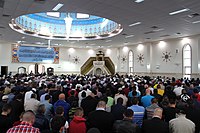Arab Australians
| Languages | |
|---|---|
| Australian English, Arabic, other Afroasiatic languages | |
| Religion | |
| Islam (Sunni · Shia) · Christianity (Roman Catholicism · Protestantism · Orthodoxy) | |
| Related ethnic groups | |
| other Arabs |
| Part of a series on |
| Islam in Australia |
|---|
 |
| History |
|
| Mosques |
| Organisations |
| Islamic organisations in Australia |
| Groups |
| Events |
| National Mosque Open Day |
| People |
Arab Australians refers to Australian citizens or residents with ancestry from the Arab world.
Overview
Arab Australians generally share a common cultural heritage, which originates in the Arabic-speaking countries of the Middle East and North Africa (MENA).[1]
According to the AHRC, most Egyptian (69%), Lebanese (61%) and Syrian (46%) immigrants to Australia settled before 1986. Other MENA populations mainly arrived later during the 1990s, such as Iraqis, Somalis and Sudanese.[1]
Although the countries of origin of Arab Australians are all primarily Islamic (>70%), emigrants to Australia from these states belonged to various religious orders. The proportion of Muslims was highest among immigrants from Somalia (97%) and Jordan (40%), followed by Syria (34%) and Iraq (31%). Most Egypt-born and Lebanon-born Australians were Christian Copts (84%) and Maronites (55%), respectively.[1]
Arab Australians are mainly concentrated in Victoria and New South Wales. Smaller groups also reside in Queensland, Western Australia and South Australia, with fewer in Tasmania, the Australian Capital Territory and the Northern Territory.[1]
Demographics
In the 2001 census, 248,807 Australian residents reported Arab ancestry. Additionally, 209,372 Australians indicated that they spoke Arabic at home. 162,283 Australian residents were born in one of the 22 Arab League nations, a proportion which represented 0.8% of Australia's population. 120,000 Australians also had a parent who was born in an Arab state.[1]
The most common countries of origin for Arab Australians were Lebanon (71,349), Egypt (33,432) and Iraq (24,832). Of these, a further 89,021 had a Lebanese-born parent and 10,296 had an Egyptian-born parent.[1] Additionally, Australia is a major tourist destination for people from the United Arab Emirates, with 14,000 Emiratis entering the country each year.[2] There is also an Emirati international student community of between 1,200 and 2,000 pupils.[3][4]
According to the AHRC, most Australian residents born in Arab nations are citizens of Australia. The citizenship take-up rate is highest among the earlier settlers, who have been established longer. 91.6% of Egypt-born residents were Australian citizens, followed by immigrants born in Lebanon (91.3%), Syria (86.2%), Somalia (70.1%), and Iraq (68.1%).[1]
Notable people
See also
References
- ^ a b c d e f g "Ismaع - Listen: Appendices" (PDF). Australian Human Rights Commission. Retrieved 29 December 2014.
- ^ Australia is keen to promote Islamic finance
- ^ "United Arab Emirates country brief". Department of Foreign Affairs and Trade.
- ^ Exploring new dimensions, Gulf News
